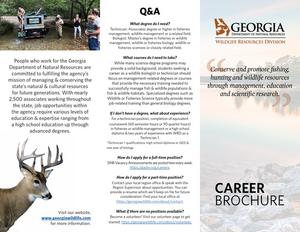People who work for the Georgia Department of Natural Resources are committed to fulfilling the agency's mission of managing & conserving the
state's natural & cultural resources for future generations. With nearly 2,500 associates working throughout the state, job opportunities within the agency require various levels of education & expertise ranging from a high school education up through
advanced degrees.
Visit our website, www.georgiawildlife.com
for more information.
Q&A
What degree do I need? Technician: Associates degree or higher in fisheries management, wildlife management or a related field.
Biologist: Master's degree in fisheries or wildlife management, wildlife or fisheries biology, wildlife or
fisheries sciences or closely related field.
What courses do I need to take? While many science degree programs may provide a solid background, students seeking a career as a wildlife biologist or technician should focus on management-related degrees or courses that provide the necessary training needed to successfully manage fish & wildlife populations & fish & wildlife habitats. Specialized degrees such as Wildlife or Fisheries Science typically provide more job-related training than general biology degrees.
If I don't have a degree, what about experience? For a technician position, completion of equivalent coursework (60 semester hours or 90 quarter hours) in fisheries or wildlife management or a high school diploma & two years of experience with WRD as a
Technician 1. *Technician 1 qualifications: high school diploma or GED & one year of biology
How do I apply for a full-time position? DNR Vacancy Announcements are posted here every week:
https://gadnr.org/careers.
How do I apply for a part-time position? Contact your local region office & speak with the Region Supervisor about opportunities. You can provide a resume which we'll keep on file for future
consideration. Find your local office at https://georgiawildlife.com/about/contact.
What if there are no positions available? Become a volunteer! Visit our volunteer page to get started: https://georgiawildlife.com/about/volunteer.
Conserve and promote fishing, hunting and wildlife resources through management, education
and scientific research.
CAREER BROCHURE
The Georgia Department of Natural Resources (DNR) comprises divisions which carry out DNR's mission to sustain, enhance, protect & conserve Georgia's natural, historic & cultural resources. As one of six divisions within DNR, the Wildlife Resources Division (WRD) is charged with conserving, enhancing & promoting Georgia's wildlife resources, including game & nongame animals, fish & protected plants. WRD is comprised of three sections.
WILDLIFE CONSERVATION
The Wildlife Conservation Section conserves & protects nongame wildlife & plants & their habitats through public education, research & management. The section conducts research & surveys on a wide variety of nongame wildlife, identifies critical habitats & implements species & habitat restoration programs. Wildlife Conservation also encourages the appreciation & enjoyment of observing wildlife, catalogs & distributes information on occurrences of rare plants, animals & natural communities, participates in cooperative habitat management with private & corporate landowners & leads our conservation education efforts.
GAME MANAGEMENT
The Game Management Section manages one million acres of land & more than 100 Wildlife Management Areas (WMAs) for hunting, fishing, wildlife enhancement, bird watching, hiking, camping & conservation education. Game Management conducts research & surveys to monitor hunter harvests, wildlife populations, & habitats. These efforts support regulations & other management activities.
FISHERIES MANAGEMENT
The Fisheries Management Section manages 500,000 acres of lakes, 12,000 miles of warm water streams & 4,000 miles of trout streams with the goal of providing high quality sport fishing opportunities. Fisheries Management surveys fish populations to determine management approaches & set regulations, operates fish hatcheries & Public Fishing Areas, constructs & maintains public boat ramps & fish attractors, provides assistance to environmental agencies, & hosts kids fishing events.
JOB CLASS DEFINITIONS
The Wildlife Resources Division has technician & biologist positions, which require different qualifications, degrees, & levels of experience.
TECHNICIANS WILDLIFE
The Wildlife Technician job series touches on all field aspects of managing DNR lands. Duties vary from maintaining roads to managing habitat through prescribed fire, helping citizens with nuisance wildlife issues, collecting wildlife research data, & responding to local & state emergencies. Skills such as carpentry & electrical, plus experience using farm & heavy equipment & collecting data, are useful.
FISHERIES In the field, a technician is generally someone who helps with data collection through a wide variety of sampling techniques (trapping, tagging, setting nets, electrofishing, etc.). Technicians also perform direct on-the-ground management activities such as raising fish in hatcheries, fertilizing lakes, & many other ongoing management activities. Operating & maintaining equipment & facilities is also a very important task for these positions.
BIOLOGISTS WILDLIFE
The Wildlife Biologist job series involves field & administrative responsibilities. Duties include monitoring wildlife habitats & populations; planning habitat management on DNR-managed lands & waters; serving on committees guiding management of species or species groups; &, using public comment, data & sound management for regulatory & research needs. Biologists work closely with wildlife technicians on habitat management plans & field work. They help citizens with habitat & wildlife issues. Experience in research, data analysis, habitat management, GIS mapping, databases, & people skills are useful.
FISHERIES From the desk & in the field, a biologist is generally someone who studies &/or manages fish & their habitats. They develop & oversee management plans & activities carried out by technicians, provide technical expertise through environmental reviews, & share knowledge about fish populations through written articles or presentations.
OTHER
Other positions available in the following job classes include administrative, communications/outreach, education and forestry.
There are heartbeats in the wilderness. They share our moments in the mountains, in the swamps, & in & on the waters of our land, wherever we might be. They are the large part of the reason we are there, whether with a camera, gun, fishing rod, or pack sack on.
Charlie Elliott
